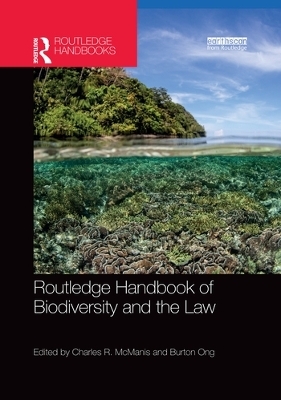
Routledge Handbook of Biodiversity and the Law
Routledge (Verlag)
978-0-367-50524-0 (ISBN)
The Routledge Handbook of Biodiversity and the Law includes chapters on fundamental and cutting-edge issues, including discussion of major legal instruments such as the Convention on Biological Diversity and the Nagoya Protocol.
The book is divided into six distinct parts based around the major objectives which have emerged from legal frameworks concerned with protecting biodiversity. Following introductory chapters, Part II examines issues relating to conservation and sustainable use of biodiversity, with Part III focusing on access and benefit-sharing. Part IV discusses legal issues associated with the protection of traditional knowledge, cultural heritage and indigenous human rights. Parts V and VI focus on a selection of intellectual property issues connected to the commercial exploitation of biological resources, and analyse ethical issues, including viewpoints from economic, ethnobotanical, pharmaceutical and other scientific industry perspectives.
Charles R. McManis is the former Thomas and Karole Green Professor of Law Emeritus and former Director of the Intellectual Property and Technology Law Program at Washington University in St. Louis, Missouri, USA. His book, Intellectual Property and Unfair Competition in a Nutshell, is now in its seventh edition. He is also co-author of Licensing Intellectual Property in the Information Age, the second edition of which was published in 2005. Burton Ong is Associate Professor in the Faculty of Law at the National University of Singapore, where he was Deputy Director of the Asia-Pacific Centre for Environmental Law between 2014 and 2017. He teaches and researches in the areas of Competition Law, Intellectual Property and Contract Law. He is the editor of Intellectual Property and Biological Resources (2004) and has an interest in the biodiversity and wildlife laws of the ASEAN member countries.
Part I: Introduction 1. Biodiversity and the Law: Mapping the International Legal Terrain 2. Biodiversity and the Law in Brief Part II: Conservation and Sustainable Use of Genetic Resources 3. Biodiversity in International Environmental Law Through the UN Sustainable Development Goals 4. Biodiversity, Protected Areas and the Law 5. The International Legal Framework for the Protection of and Sustainable Use of Marine Biological Diversity 6. Biosecurity, Invasive Species and the Law 7. Biotechnology, Biodiversity and the Environment 8. Legal Responses in the United States to Biodiversity Loss and Climate Change 9. China’s Biodiversity Law 10. The International Treaty on Plant Genetic Resources for Food and Agriculture: Toward the Realization of Farmers’ Rights as a Means of Protecting and Enhancing Crop Genetic Diversity Part III: Access and Benefit-Sharing 11. Access to and Benefit-Sharing of Marine Genetic Resources Beyond National Jurisdiction: Developing a New Legally Binding Instrument 12. The Impact of Natural Products Discovery Programs on our Knowledge of the Flora of Madagascar 13. Regulatory Measures on Access and Benefit-Sharing for Biological and Genetic Resources: National and Regional Perspectives from the Philippines, Singapore and ASEAN 14. One Step Forward, Two Steps Back? Implementing Access and Benefit-Sharing Legislation in South Africa 15. De-Materialising Genetic Resources: Synthetic Biology, Intellectual Property and the ABS Bypass Part IV: Traditional Knowledge Protection 16. Traditional Knowledge: Lessons from the Past, Lessons for the Future 17. Bioprospecting and Traditional Knowledge in Australia 18. If we have never been Modern, they have never been Traditional: ‘Traditional Knowledge’, Biodiversity, and the Flawed ABS Paradigm 19. Where Custom is the Law: State and User Obligations to 'Take into Consideration' Customary Law Governing Traditional Knowledge and Genetic Resources Part V: Biodiversity and Intellectual Property Protection 20. Biodiversity, Intangible Cultural Heritage and Intellectual Property 21. Intellectual Property, Biodiversity and Food Security 22. Sisyphus Redivivus? The Work of WIPO on Genetic Resources and Traditional Knowledge 23. Is the Whole Greater than the Sum of its Parts? A Critical Reflection on the WIPO IGC Part VI: The Ethics, Economics and Science-Policy Interface of Biodiversity Protection 24. Naturalizing Morality 25. Making Legal Use of the Valuation of Nature 26. Bounded Openness as the Modality for the Global Multilateral Benefit-Sharing Mechanism of the Nagoya Protocol 27. The IPBES, Biodiversity and the Law: Design, Functioning and Perspectives of the Intergovernmental Science-Policy Platform on Biodiversity and Ecosystem Services
| Erscheinungsdatum | 02.03.2020 |
|---|---|
| Reihe/Serie | Routledge Environment and Sustainability Handbooks |
| Zusatzinfo | 5 Tables, black and white; 7 Line drawings, black and white; 1 Halftones, black and white; 13 Illustrations, black and white |
| Verlagsort | London |
| Sprache | englisch |
| Maße | 174 x 246 mm |
| Gewicht | 453 g |
| Themenwelt | Naturwissenschaften ► Biologie ► Ökologie / Naturschutz |
| Recht / Steuern ► EU / Internationales Recht | |
| Recht / Steuern ► Öffentliches Recht ► Umweltrecht | |
| Recht / Steuern ► Wirtschaftsrecht ► Urheberrecht | |
| ISBN-10 | 0-367-50524-X / 036750524X |
| ISBN-13 | 978-0-367-50524-0 / 9780367505240 |
| Zustand | Neuware |
| Haben Sie eine Frage zum Produkt? |
aus dem Bereich


